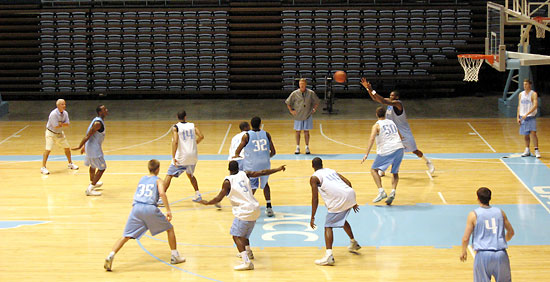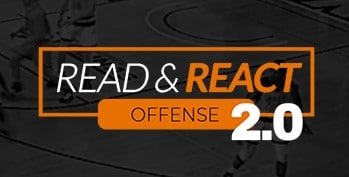The following article is courtesy of Texas A&M Special Assistant Mitch Cole. Mitch shares some fantastic basketball ideas in his basketball newsletter.
Most of you are approaching the time of year when planning your practices becomes one of the most important action items in your day. If you are a new head coach, your mind can spin into a hundred different directions as you consider what your team needs to work on during a particular day or week in practice. Veteran guys have an idea of what has worked for them, but are usually looking for improved ways to make practice better.
The following are a few principles/ideas that might be beneficial for you in planning efficient yet effective practices:
- HAVE A MASTER TEACHING PLAN
– Have a LIST of concepts (with dates) that you plan to cover the first 4-6 weeks
– Categorize your Offense and Defensive Concepts to cover
– Special Situations to cover
- PLAYER DEVELOPMENT PLAN
– Build in Practice Time to insure players continue to improve (ex 10-20 min)
– Have some quantitative goals for each player to achieve (ex. 100 shots each practice, etc)
– Structure “in season” development with game specific shots in mind
- DAILY EMPHASIS AND COMMUNICATION
-OVER Communicate what you want to emphasize each day on offense/defense
-Hold players accountable to execute the particular emphasis.
-Decide on a WEEKLY THEME and have the team be able to articulate it!
- TEACHING TO COMPETITION RATIO, APPROPRIATE FEEDBACK
-Aim to strike an appropriate balance of teaching and competition depending on time of year.
–Detailed FEEDBACK can be given during teaching segments. (ex 30-40 second explanations)
–Quick, targeted FEEDBACK should be given during highly competitive situations. (ex 5-10 seconds)
- MAXIMIZE COURT SPACE
-Spend time organizing to get the most out of your space in the gym. How can I use everyone?
-ex. Ball-handling, Passing can be done off the court if space is tight.
-Station work with short lines. Dividing groups during water breaks can help.
- TIME MANAGEMENT
-Analyze how long drills are taking. Work for efficiency. Trim each week. Consider attention spans!
–Develop and use your staff when appropriate when splitting up in groups.
-Fewer items on the plan, more depth in high priority areas.
-Consider two-a-days OR “walk thrus” when you need to teach more.
- LEARNING/CORRECTION STATIONS
-Staff makes notes of which players are struggling to learn or execute certain concepts or techniques.
-Structure small group stations before or after practice for certain players who are behind.
-Younger or new players may need more of this.
- MULTI-TASK/ PROBLEM SOLVING SEGMENTS
-More experienced teams who are fundamentally sound need to be able to handle difficult situations.
-Put them in scenarios that make them solve problems. (ex. Defend unique actions that you haven’t worked on, see if they can talk themselves through it.)







